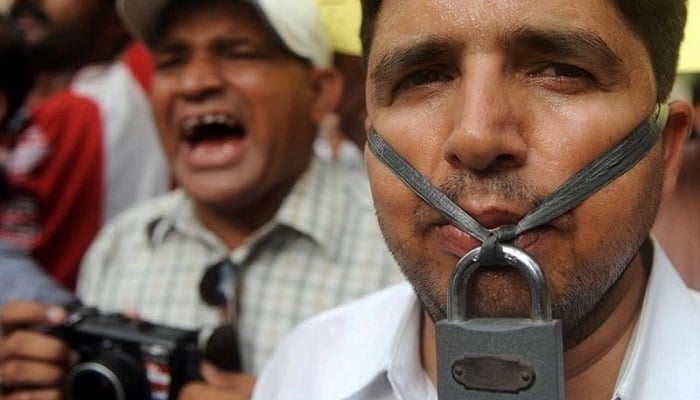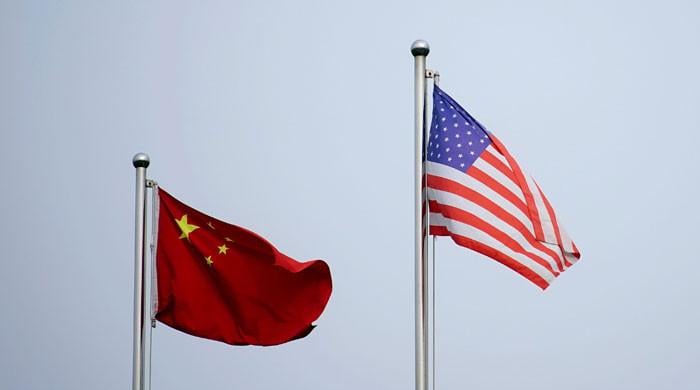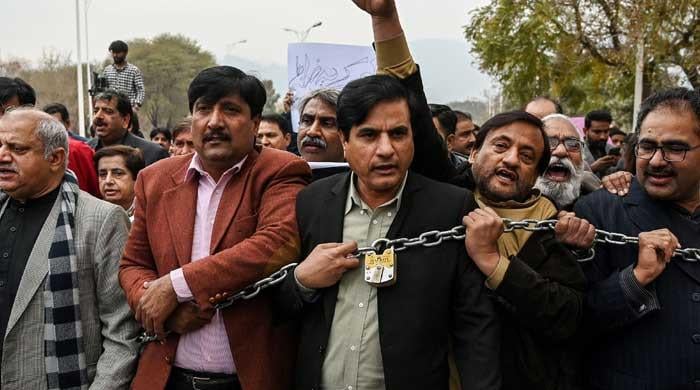Freedom of speech and information: Is the state taking our rights seriously?
What law authorises preventing any citizen from listening to an absconder’s speech? Short answer: None
November 29, 2021

Those who wield power in the Islamic Republic do not expect to be confronted with resistance, disclosure, or critique in full view of the populace. Or at all. The last few weeks have been good ones for those who delight in impudence. The winter air has failed to chill what has been brewing for some time now. These weeks have been not so good for those who seek stern order and regimentation. And they have brought distress to those who look for substance and gravitas in the running of the affairs of the state.
The organisers of the recently concluded Asma Jahangir Conference 2021 provided plenty by way of impudence in pursuit of substance. In inviting former prime minister Nawaz Sharif to address the closing session of the conference, the organisers forced both state and society to take a position on the fundamental rights contained in Articles 19 and 19A of the constitution that guarantee freedom of speech and information. The telephonic speech by the former prime minister was sought to be disrupted by the full might of the brawn available to the Pakistan Telecommunication Authority. Can fundamental constitutional rights be trampled over by personnel deployed by an agency to place jammers that disrupt WiFi access to the worldwide net? Do those with shears to cut down cables hold the ultimate authority to allow or prohibit any particular speech?
Does an absconder cease to be a holder of the various human rights, including the right to speak, that are considered inalienable? Do an absconder’s words remain ‘information’ that other citizens of the state have the right to hear, if they so desire, in exercise of the right to information assured by the constitution? Can an absconder be allowed to post letters or transmit recorded messages? Where do we draw the line?
An absconder approaching a court of law for relief through a representative, without subjecting him/herself to the authority of the court, may well be denied relief on account of his defiance of the court’s jurisdiction. Which law, however, disallows an absconder from using the airwaves or cyberspace for communication without seeking an order from a court? What law authorises preventing any citizen from listening to an absconder’s speech? Short answer: None. Would such laws, if made, fall foul of the fundamental rights assured by the state? Or should such restrictions, if imposed by law, be considered reasonable restrictions on the fundamental rights of speech and information?
A society that takes the idea of rule of law seriously and accepts certain rights as fundamental must confront these questions. Principles rather than present animus or political expediency must inform the outcome we adopt. Principles once embraced can emerge in unexpected settings to yield consequences many might then find unacceptable. History stands witness to the power of the words of absconders and those driven into exile, from Voltaire to Khomeini. While no equivalence is intended or suggested, the principles that we adopt today travel beyond the particular and speak to the general.
The prime minister set the defiance ball rolling early in the season, in autumn, via a confrontation regarding the appointment of the head of the ISI. Was this civilian supremacy or the desire to have certain matters taken care of before November 20? The chiryas remained busy chirping away. The joint session of parliament on November 17 and the sudden about-turns of supposedly disaffected allies in favour of the government stoked the ambers of sundry conspiracy theories. On that day, 33 pieces of paper turned into federal law in a single joint session, an unprecedented event even in a country in which constitutional form has often taken precedence over substance.
Some basics may be stated, starkly, as background to the parliamentary spectacle of November 17. The joint session of parliament is a device embedded in the constitution to overrun the Senate, a forum elected by the members of the provincial assemblies along with two members from Islamabad elected by the National Assembly. The provenance of the provisions in the constitution that allow a joint session lies in a fear of the provinces that attended the aftermath of the fall of Dhaka. The constitution adopted in 1973 reflected the aftermath. The demise of the elected governments of Balochistan and the then [former] NWFP later in the year was the fruition of the fear. This is a fear that refuses to subside. The Eighteenth Amendment of 2010 eased the passage of bills through a joint session by replacing the previous requirement of a majority of the total membership of the two houses with a majority of those present and voting during a particular session. This was remarkable, and ironic, given the provincial empowerment spirit of the Eighteenth Amendment.
The National Assembly provides representation to each province in proportions determined by the population of each. The Senate subverts the numerical superiority of the larger provinces by giving equal weight to each province. Balochistan, with less than five percent of the population of the country, stands as the equal of Punjab with more than 60 percent. Each has 20 members in the Senate. The normal business of law-making requires the Senate to approve or reject all proposed legislation, other than what are called money bills that deal primarily with federal taxation. This allows the smaller provinces the possibility of blocking in the Senate legislation backed by a party or coalition with a majority in the National Assembly on account of its strength in the larger provinces. The intended outcome is legislation that has wide support across the federating units.
The membership of the Senate also reflects the strength of the various parties in the provincial assemblies in elections held prior to the last election. This allows for some measure of continuity. Since Senate members serve tenures of six years, those elected in March 2018 by the provincial assemblies elected in May 2013 are still serving. This constitutional scheme allows the Senate to act as a restraint against a current majority by keeping in play electoral outcomes of the recent past and not just the election that has resulted in the ruling majority of the day in the National Assembly. The intended outcome is legislation that has more than passing temporal support.
The joint session of parliament merges the 102 members of the Senate into the 343 members of the National Assembly. In theory, a simple majority of those present and voting at the time of a joint session can be provided by up to 222 members of the National Assembly alone. This number could be drawn from members of the National Assembly from Punjab and one of the other provinces. The Senate as the house of the provinces stands undermined in a joint session. This undermining of the Senate is a move against the federal character of the state that must be resorted to most rarely.
The joint session of parliament of November 17 was summoned precisely because the government felt unsure of securing a majority in the Senate – which then had to be subdued. Reams of uncontentious legislation such as the National Institute of Arts Act were rolled into a vast legislative agenda, the real point of which was the passage of certain amendments to the election laws. Electronic voting for those voting within Pakistan along with voting through the internet for overseas Pakistanis was mandated into law by the joint session, with the entire opposition, minus the usual quislings, in protest.
The concerns of the Election Commission of Pakistan, the constitutional guardian of the electoral process, were summarily overruled. The scene has been set for an election in 2023, or earlier, whose credibility will inevitably be challenged, for good as well as bad reasons, by all who end up believing themselves to be proteges of lesser gods.
Hum dekhain ge…
The writer is an advocate of the Supreme Court of Pakistan. He can be reached on [email protected] and tweets @salmanAraja
Originally published in The News











